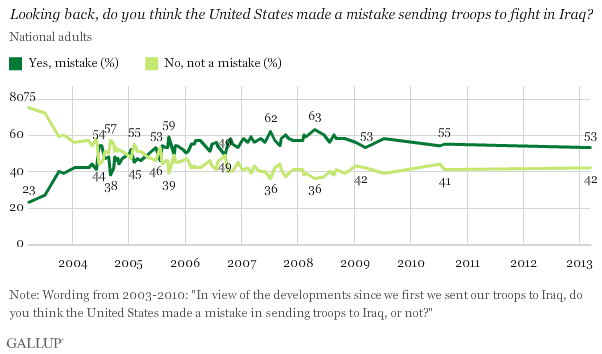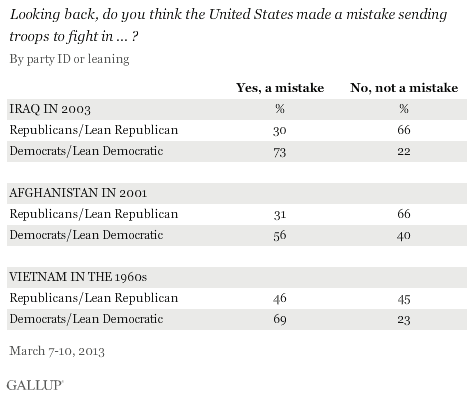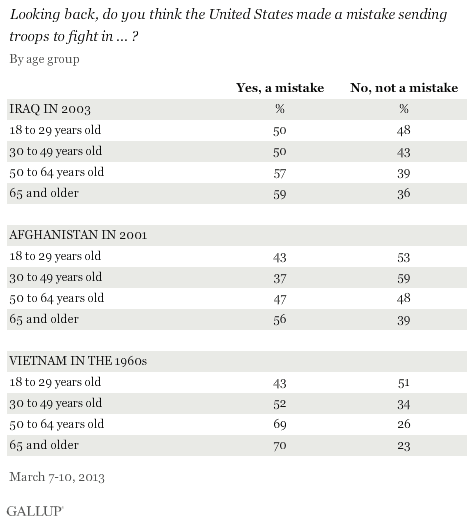WASHINGTON, D.C. -- Ten years have passed since the United States and its allies invaded Iraq, and it appears the majority of Americans consider this a regrettable anniversary. Fifty-three percent of Americans believe their country "made a mistake sending troops to fight in Iraq" and 42% say it was not a mistake.

The March 7-10 results mark the first time Gallup has asked this question since the full withdrawal of American troops in December 2011. Although majorities or near-majorities have viewed the conflict as a mistake continuously since August 2005, the current 53% is down from the high point of 63% in April 2008.
This week marks the 10th anniversary of the beginning of the Iraq war. Though the engagement has now come to an end, this seminal event in recent American history still looms large in the national political consciousness. In his second inaugural address, President Barack Obama highlighted the end of the war, stating "a decade of war is now ending" and, more recently, Sen. John McCain confronted now-Secretary of Defense Chuck Hagel as to whether the 2007 Iraq war "surge" was successful.
Americans initially supported the war, with substantial majorities in 2003 saying the U.S. decision to get involved in Iraq was not a mistake. However, attitudes changed relatively quickly, and by the summer of 2004, a majority of Americans called the war a mistake.
Opinions fluctuated somewhat thereafter but, with one exception, since August 2005, a majority has said the war was a mistake each time Gallup has asked the question -- and at several points, more than 60% said so. The last time Gallup asked this question, in August 2010, 55% called the war a mistake.
A majority of Americans also view Vietnam, another major U.S. military engagement of the modern era, as a mistake. The same March survey finds 57% of Americans saying the Vietnam War -- which resulted in the most U.S. casualties of the three recent wars -- was a mistake, but that is down from 69% in November 2000.
On the other hand, a slim majority of Americans (51%) say the war in Afghanistan -- a military engagement still in progress, albeit with a scheduled withdrawal date -- was not a mistake. Still, 44% believe sending troops to Afghanistan was a mistake -- the highest on record.
Republicans Still Stand Behind Iraq War; Seniors Are Opposed
Wars often spur times of immense national unity -- moments in which partisan politics dissipate and dissent is muted. This effect is famously temporary, and with respect to the Iraq war, it is clear that attitudes on whether it was a mistake break heavily along partisan lines, despite nearly unanimous initial support.
Not surprisingly, given that the war was begun in the administration of a Republican, former President George W. Bush, 66% of respondents who identify as or lean Republican say the U.S. did not make a mistake in sending troops to fight in Iraq, while 30% express the contrary view. In contrast, 73% of Democratic leaners or identifiers see the military campaign as a mistake. Twenty-two percent in that group say it was not a mistake.

Recent wars have been much more polarizing than past conflicts such as World War II, which enjoyed strong bipartisan support when Gallup last inquired on the matter in 2004. Republicans and Republican leaners say the Afghanistan invasion was not a mistake by more than a 2-1 margin -- 66% vs. 31%. Democrats' and Democratic leaners' views are inverted on this matter: 56% think it was a mistake to send troops to Afghanistan, while 40% say it was not.
Republicans and leaners are more evenly divided on the Vietnam War -- the only war of the three recent ones that was initiated under a Democratic president -- with 46% saying it was a mistake and 45% saying it was not. Democrats again lean heavily toward the "mistake" column, by 69% to 23%.
Generational Divide Clear on Recent Wars, Including Iraq
Older Americans are more likely than younger ones to say the wars in Iraq, Afghanistan, and Vietnam were a mistake.
Nearly six in 10 Americans aged 65 or older and 57% of those aged 50 to 64 say it was a mistake to send troops to Iraq, compared with 50% each of 18- to 29-year-olds and 30- to 49-year-olds. Majorities of those aged 65 or older -- who over their lifetimes have seen various U.S. military operations -- see all three wars (Iraq, Afghanistan, and Vietnam) as a mistake, the only age group to do so.
Young adults are the only age group in which a majority says the Vietnam War was not a mistake (51%) -- perhaps because they have no personal memory of the conflict.

Implications
On the 10th anniversary of the Iraq war, most Americans judge the conflict "a mistake." While Americans long ago soured on the military decision, recent opinion has changed little, now that U.S. troops have been completely withdrawn from the country for more than a year. However, the war is not without its supporters. Most Republicans still believe the invasion was not a mistake.
Nonetheless, the national consensus is decidedly against the Iraq war, as well as the more distant Vietnam War. Even the war in Afghanistan, launched shortly after the horrific 9/11 attacks and which President Obama once referred to as the "good war," has a sizable opposition bloc. The unpopularity of these wars has led some political commentators to warn of a new "American isolationism," which limits or curtails future military action. While these data cannot confirm this, it is clear that Americans are not of one mind in believing that past military conflicts were the right course of action and, as such, may be more cautious about supporting future actions.
Survey Methods
Results for this Gallup poll are based on telephone interviews conducted March 7-10, 2013, on the Gallup Daily tracking survey, with a random sample of 1,022 adults, aged 18 and older, living in all 50 U.S. states and the District of Columbia.
For results based on the total sample of national adults, one can say with 95% confidence that the margin of sampling error is ±4 percentage points.
Interviews are conducted with respondents on landline telephones and cellular phones, with interviews conducted in Spanish for respondents who are primarily Spanish-speaking. Each sample of national adults includes a minimum quota of 50% cellphone respondents and 50% landline respondents, with additional minimum quotas by region. Landline telephone numbers are chosen at random among listed telephone numbers. Cellphones numbers are selected using random digit dial methods. Landline respondents are chosen at random within each household on the basis of which member had the most recent birthday.
Samples are weighted to correct for unequal selection probability, nonresponse, and double coverage of landline and cell users in the two sampling frames. They are also weighted to match the national demographics of gender, age, race, Hispanic ethnicity, education, region, population density, and phone status (cellphone only/landline only/both, cellphone mostly, and having an unlisted landline number). Demographic weighting targets are based on the March 2012 Current Population Survey figures for the aged 18 and older U.S. population. Phone status targets are based on the July-December 2011 National Health Interview Survey. Population density targets are based on the 2010 census. All reported margins of sampling error include the computed design effects for weighting.
In addition to sampling error, question wording and practical difficulties in conducting surveys can introduce error or bias into the findings of public opinion polls.
View methodology, full question results, and trend data.
For more details on Gallup's polling methodology, visit www.gallup.com.
